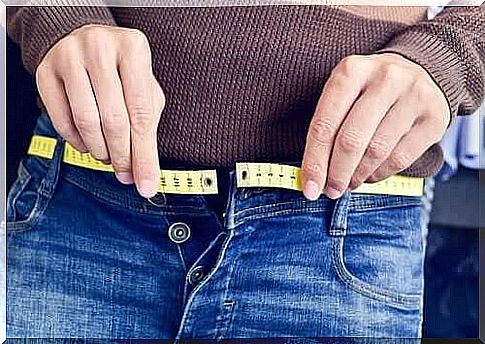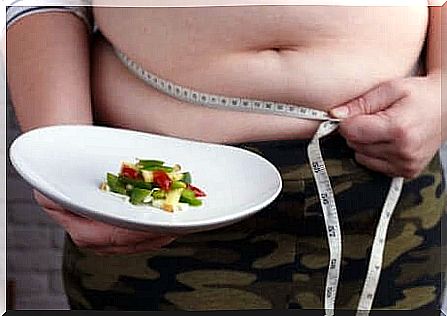Why Are We Gaining Weight?
Gaining or losing weight, except in pathological situations, is a purely mathematical matter. Find out why we are gaining weight in this article.

Why are we gaining weight? The answer to this question is very simple: because we ingest more calories than we are able to burn. Despite this simple equation, the two variables can be affected by a multitude of factors.
Certain hormonal mechanisms decrease energy expenditure. Or bad habits increase the intake of calories. Knowing this, every slight imbalance causes weight loss or gain. Let’s see this in more detail.
Why are we gaining weight? Energy expenditure
This is an element that can be changed. There is indeed an energy expenditure by the simple fact that we are alive, it is the basal energy expenditure. From there, any physical activity increases the daily energy expenditure.
Sport has a dual function. On the one hand, it constitutes an energy expenditure as such, and on the other hand, it increases muscle tone and volume. This results in an increase in energy expenditure at rest.
To maximize this effect, strength training should be prioritized over aerobic training. The latter could even lead to a loss of muscle mass.
Therefore, regular exercise is a great way to control weight, according to an article published in the journal “ Metabolism ”. It is used as well to prevent obesity as to fight it.
Sedentary people gain weight more easily because the amount of food they need is often less than their appetite. Which leads to overeating.
Thus, a possible answer to the question “Why do we gain weight?” is that we are not getting enough physical exercise.

Why are we gaining weight? Calorie intake
This is the other modifiable variable in the weight gain equation. It is indeed essential to try to adapt the diet to the level of activity. Consequently, athletes have greater energy needs than sedentary people.
Normally, appetite tends to match energy needs. Especially in individuals with ectomorphic and mesomorphic morphotypes. Nevertheless, some people have deficiencies in the regulation of appetite. Either by hormonal imbalances (thyroid hormones and ghrelin), or by a caloric underestimation of food.
As a result, many people think they are consuming fewer calories than they actually ingest. This then leads to weight gain. This is another possible answer to the question “why are we gaining weight?”.
Excessive consumption of fat, bread or processed foods can be harmful. Sauces are also foods that contribute to an increase in caloric density. Let’s not forget the alcohol either. These are data that can be found in a study published in the journal “ Obesity ”.
Pathologies associated with weight gain
However, there are groups of people who can gain weight despite apparently healthy eating. This is the case, for example, of those who suffer from hypothyroidism.
These people have a deficit in the production of a hormone that regulates energy expenditure. As a result, their needs are reduced and the amount of food they require is much less than that of an individual who does not suffer from this disease.
On the other hand, some people suffer from alterations in the production of ghrelin. This hormone controls appetite and is governed by a set of receptors. A failure in the function of the receptor can lead to excessive production of this hormone. Even when energy needs are met. The consequence is then weight gain.
All of these situations are generally beyond dietary control. In general, these patients require pharmacological support to regulate their weight. Medicines effectively regulate hormonal systems and simplify nutritional management.

Pathologies associated with weight loss
Besides the diseases that throw the equation out of balance on the weight gain side, there are others that have the opposite effect. A clear example is hyperthyroidism or cancer. Two pathologies that increase energy expenditure at rest as well as nutritional needs.
This must be compensated by an increase in the caloric density of the diet. If not, then the person may lose weight, making it difficult to control the disease.
The role of the gut microbiota
In recent years, however, a third variable has emerged. Namely the role of living organisms in the intestine. The microbiota could indeed have a considerable impact on nutrient absorption and weight gain.
Probiotic supplements could then be a turning point in weight reduction strategies. However, this area is still being studied.
We gain weight due to an energy imbalance
Gaining or losing weight, except in pathological situations, is a purely mathematical matter. If we take in more calories than we need, or are able to burn, we gain weight. Otherwise, we lose weight.
This is why nutritional education is a crucial element in becoming aware of the number of calories we ingest. This will avoid underestimating or overestimating the food we eat. And will facilitate weight control and prevention of complex diseases.









